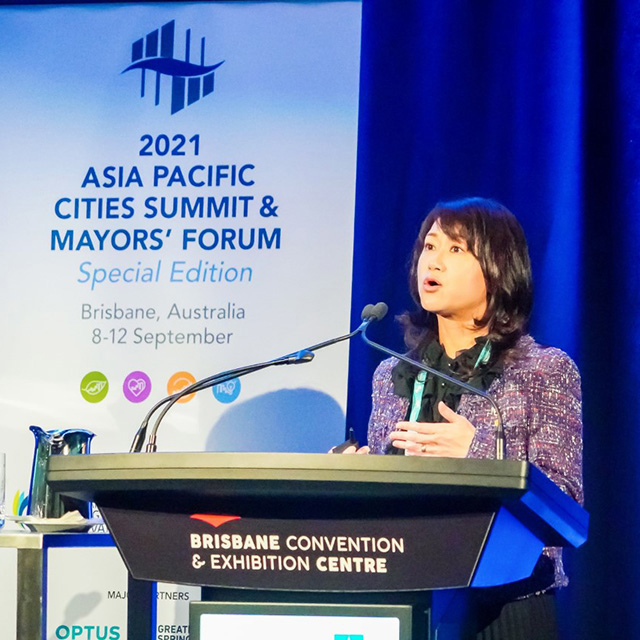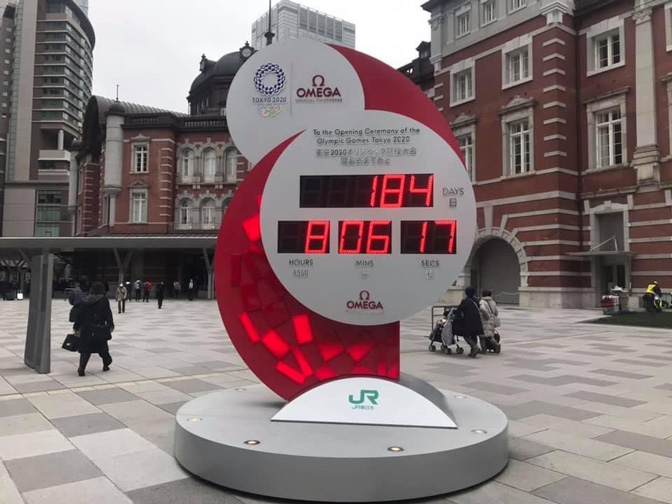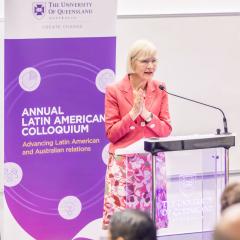A UQ researcher is examining residents’ perceived wellbeing and life satisfaction in Ichikawa City in Japan in response to the Tokyo 2020 Olympic and Paralympic Games and government management of COVID-19.

Dr Monica Chien, Senior lecturer in the UQ Business School, presented on her research with Ichikawa at a panel at the 2021 Asia Pacific Cities Summit (APCS) and Mayors Forum, held in Brisbane and online in September.
The Summit brings together leaders from government as well as business and industry – especially those with a focus on innovation and entrepreneurship – from the Asia Pacific to explore how they can work together on issues such as inclusion and accessibility to grow meaningful cities.
“Presenting on my collaboration with Ichikawa at the APCS summit provided a great opportunity to highlight UQ’s research leadership and impact and its global engagement more broadly,” Dr Chien said.
Dr Chien’s presentation focused on her current research with Ichikawa, a city in the Chiba Prefecture in Japan 20 kilometres outside of Tokyo.
Her research aims to better understand residents’ perceptions of the Healthy City Ichikawa program within the broader context of the Tokyo 2020 Olympic and Paralympic Games and the government’s handling of the COVID-19 pandemic in Japan.
“The collaboration shows that policy makers and researchers can join forces to address issues related to a city’s positioning and development and find evidence-based solutions,” Dr Chien said.
After learning about Dr Chien’s previous experience working with cities in Japan at the 2019 APCS, the Mayor of Ichikawa contacted Dr Chien to tap into her expertise around mega events, destination marketing and branding.
“At that time, a lot of cities around Tokyo were preparing for the Olympics and they wanted to capitalise on the opportunity to help improve their image,” Dr Chien said.

“I’ve conducted several international projects in relation to residents’ evaluations of the destination’s tourism and mega sporting event development – including a multi-year resident consultation project for a non-host city of the 2012 London Olympic and Paralympic Games – looking at residents’ perceptions of event legacies.”
Due to its location in the capital region in Japan, Dr Chien explained that Ichikawa had developed as a residential city and is often nicknamed Tokyo’s ‘bed town’.
“Most residents commute to Tokyo to conduct their daily lives and only return to Ichikawa to sleep, meaning they feel little attachment towards their city.
“Ichikawa’s vision is to shift this image from ‘bed town’ to a city that is urban and cosmopolitan, enriched with modern functionality and diverse lifestyles,” she said.
As the project with Ichikawa developed, Dr Chien brought in her collaborators from UQ Partner Hitotsubashi University to act as liaison with Ichikawa City’s Division for the Promotion of a Healthy City.
“This collaboration brought the existing relationship between UQ and Hitotsubashi closer, broadening our partnership to beyond student mobility to collaboration between researchers.”
Stage one of the project took place in June 2021, shortly before the Olympics, when Dr Chien and the Ichikawa team held resident consultations via an online survey.
“The survey included questions about residents’ perceived physical and mental wellbeing, their evaluations of the city’s living environment, facilities, health systems, cost of living, cultural programs, sport, education, accessibility – all aspects of that feed into the concept of a healthy city.”
Dr Chien explained that another important aspect of the study was to assess residents’ trust of the government, especially regarding its planning for the Olympics and its response to COVID-19.
“Both anecdotal and research evidence suggested that a lot of residents lost their trust in the government’s policies and decisions in relation to their handling the COVID-19 situation and their decision to hold the Olympic Games during the pandemic.”
Dr Chien is part of the UQ Business School’s Trust, Ethics and Governance Alliance and explains that trust becomes very important if governments want to bring their residents on board with new initiatives.
“We are interested to find out if residents’ trust of the government influences their perceptions of wellbeing and life satisfaction, as well as their evaluations of Ichikawa’s healthy city initiatives.”
Currently in the second stage of the project, Dr Chien and the team are conducting a survey to find out what impact the Olympics had on residents’ health and wellbeing now that the mega-event is over.
The third stage of the project will include detailed in-person interviews scheduled for later this year.
“We want to see if the Olympics changed residents’ perceptions of their city,” Dr Chien said.
“Did they lift people’s spirits and provide a much-needed boost to wellbeing?”
It will be interesting to see what results come from the final stage of Dr Chien’s collaboration with Ichikawa and what this might mean for Brisbane when it hosts the Olympic Games in 2032.
Join us at UQ’s inaugural Japan Day on Wednesday 10 November 2021
The University of Queensland (UQ) has many partnerships with Japan across Universities, Industry and Government. The inaugural UQ-Japan Day will explore existing collaborations and new opportunities to strengthen UQ’s engagement with Japan.



